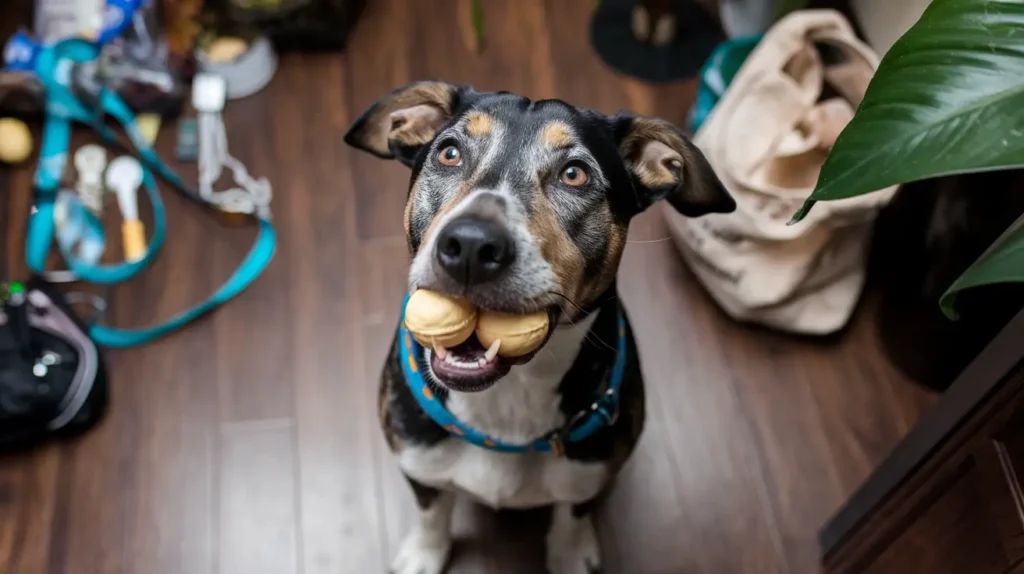Can Dogs Eat Turkey? The Nutritional Benefits Of Turkey For Dogs!
Turkey is a popular food, especially around the holidays, but many dog owners wonder, can dogs eat turkey?. Whether it's safe for their furry friend or not? The good news is that dogs can eat turkey, but there are some important considerations to keep in mind before sharing your holiday feast with your pet. Let’s dive into the details!
Table of Contents
Is Turkey Healthy For Dogs?
Turkey is not only a tasty treat for humans but also offers several nutritional benefits for dogs when served appropriately as it provides a wealth of nutrients beneficial for their growth and wellbeing.
Here’s a step-by-step breakdown of the nutritional benefits of turkey for dogs:

- Supports Muscle Development: Turkey is an excellent source of protein, a key nutrient that helps dogs build and maintain strong muscles.
- Aids in Tissue Repair: Protein plays a vital role in repairing body tissues, especially helpful for active dogs or those recovering from injuries.
- Boosts Immune Function: Protein supports the production of antibodies that help a dog’s immune system fight off infections.
- Increases Energy Levels: Protein is a primary source of energy, helping dogs stay active and alert.
- Vitamin B6 and B12: These vitamins are crucial for brain function, supporting cognitive health, and reducing the risk of neurological issues.
- Energy Metabolism: B vitamins help convert food into energy, ensuring that dogs can make the most out of their meals.
- Cell Health and Growth: B vitamins support cell growth and repair, important for puppies and senior dogs alike.
- Zinc: Zinc promotes skin health and coat quality while also supporting immune function and wound healing.
- Selenium: This mineral acts as an antioxidant, protecting a dog’s cells from damage, and aids in thyroid function.
- Phosphorus: Phosphorus is essential for strong bones and teeth and works with calcium to maintain skeletal health.
- Turkey breast, in particular, is a lean meat, meaning it’s low in fat and an excellent option for dogs needing to manage their weight.
Turkey is a healthy, protein-rich, and nutrient-dense food option for dogs when served plain, without seasonings, bones, or skin.
Is Turkey Safe for Dogs?
While turkey itself is safe for dogs, how it is prepared can make a significant difference.
Cooked turkey is generally safe for dogs, but raw turkey carries the risk of salmonella, which can be harmful to both dogs and humans. Always ensure that any turkey you give your dog is fully cooked to a safe internal temperature.
The skin of the turkey is high in fat and can cause digestive issues or even lead to pancreatitis in dogs. Additionally, cooked bones are a major choking hazard and can splinter, causing internal injuries.
Potential Risks of Feeding Turkey to Dogs
While turkey can be a healthy option, there are risks associated with feeding it to your dog.
- The fat content in turkey, particularly in the skin, can lead to pancreatitis, an inflammation of the pancreas that can be life-threatening. Always remove the skin before giving turkey to your dog.
- As mentioned earlier, seasonings like garlic and onions are toxic to dogs and can cause serious health issues. Even a small amount can be harmful, so it's best to keep seasoned turkey away from your pet.

Can Dogs Eat Turkey? Medical Research & Statistics
Medical and veterinary research generally confirms that plain, cooked turkey can be safe for dogs, provided it’s prepared correctly and free from skin, bones, or seasoning. Studies have shown that turkey provides dogs with lean protein, which supports muscle development and energy levels. It’s also rich in vitamins and minerals such as B vitamins, selenium, and phosphorus, which are essential for bone health and immune function.
However, precautions are necessary. Bones from cooked turkey are brittle and can splinter, posing risks of choking or intestinal blockages, which can require emergency medical intervention. Additionally, seasoning and fatty parts (like turkey skin) can cause digestive issues or even pancreatitis in sensitive dogs.
Veterinary experts, such as those from Boulder Veterinary Hospital and The Vets, recommend only feeding dogs plain, boneless turkey in moderation. They advise that turkey should make up less than 10% of a dog’s diet to prevent any digestive or weight issues. Consulting with a veterinarian before introducing turkey to a dog's diet can help ensure that the added protein is beneficial without posing health risks.
Best Ways to Cook Turkey for Dogs: Step-by-Step Guide
Turkey can be a nutritious and tasty treat for dogs when prepared properly. Here’s a simple guide on the best ways to cook turkey for your dog while ensuring it’s healthy and safe.
- What to Buy: Choose plain, unseasoned turkey. Avoid turkey with added salt, spices, or seasoning as these can be harmful to dogs.
- Types: Turkey breasts or ground turkey are excellent choices because they are lean and easy to cook.
- Remove Skin and Bones: Skin contains too much fat, which can upset your dog’s stomach. Bones, especially cooked, can splinter and cause harm. So, remove both.
- Trim the Fat: Excess fat can lead to digestive issues or even pancreatitis in dogs.
- Step 1: Fill a pot with water.
- Step 2: Add the turkey meat (breast or ground turkey).
- Step 3: Bring the water to a boil and then reduce to a simmer.
- Step 4: Cook until the turkey is fully cooked through (about 20–30 minutes depending on the thickness of the meat).
- Step 5: Remove the turkey and let it cool before serving.
- Benefits: Boiling retains moisture without adding any harmful ingredients. It’s the simplest method to ensure a soft texture that’s easy for dogs to digest.
- Step 1: Preheat your oven to 350°F (175°C).
- Step 2: Place the turkey breast or ground turkey in a baking dish.
- Step 3: Cover the dish with aluminum foil to prevent the meat from drying out.
- Step 4: Bake for about 30–40 minutes or until the internal temperature reaches 165°F (74°C).
- Step 5: Let the turkey cool completely before serving it to your dog.
- Note: Do not season the turkey with salt, garlic, onions, or any spices. Plain, baked turkey is safe for dogs.
- Step 1: Set up a steamer by boiling water in a pot and placing a steamer basket on top.
- Step 2: Place the turkey (breast or ground) in the steamer basket.
- Step 3: Steam for about 20–25 minutes or until thoroughly cooked.
- Step 4: Remove from heat, let the turkey cool, and chop it into bite-sized pieces before serving.
- Benefits: Steaming preserves more nutrients compared to boiling.

How to Serve Turkey to Your Dog?
- After cooking, shred or cut the turkey into small, manageable pieces appropriate for your dog’s size.
- You can mix the turkey with your dog’s regular kibble or add it as a topper.
- Store leftover turkey in an airtight container in the refrigerator for up to 3 days.
- Freeze any leftovers if you won’t use them within that time frame.

Avoid These Ingredients During Serving Turkey To Dogs
- Seasonings: Salt, pepper, garlic, onions, or spices can be toxic to dogs.
- Butter/Oils: Excess fats are unnecessary and can cause digestive problems.
- Stuffing: Never feed turkey cooked with stuffing to your dog, as it often contains harmful ingredients like onions and garlic.
Bonus Tips!
- Portion Control: While turkey is healthy, it should be fed in moderation as part of a balanced diet.
- Mixing: You can mix turkey with vegetables like carrots or green beans for added nutrition.
Can Dogs Eat Turkey Bones?
No! Cooked turkey bones can easily splinter and cause serious harm to your dog.
Cooked bones become brittle and can splinter when chewed, potentially leading to choking, internal bleeding, or blockages in the digestive tract.
If your dog eats a cooked bone, contact your vet immediately. Watch for signs of distress, such as vomiting, difficulty passing stool, or lethargy, and seek prompt medical attention.

Can Dogs Eat Raw Turkey?
Yes, dogs can eat raw turkey, but there are some important considerations to keep in mind. Turkey is a lean protein that provides essential amino acids, B vitamins, and minerals, which can support a dog’s muscle health, immune function, and overall vitality.

Can Dogs Eat Turkey Necks
Turkey necks can be a nutritious addition to a dog’s diet when served properly. They are high in protein and essential nutrients, including glucosamine and chondroitin, which support healthy joints, especially beneficial for older dogs. Turkey necks also contain calcium and phosphorus, promoting bone health.
- Raw vs. Cooked: Only offer raw turkey necks. Cooking bones makes them brittle and prone to splintering, which can cause internal injuries or blockages.
- Size Consideration: Ensure the neck is an appropriate size for your dog. Large dogs might handle bigger necks easily, while smaller dogs should be given smaller pieces or supervised closely.
- Supervision: Always supervise, particularly if it’s a new treat for your dog. Dogs with sensitive stomachs or history of gastrointestinal issues might need to avoid them entirely or start with very small amounts.
While generally safe, raw poultry carries a slight risk of bacterial contamination. Ensuring good hygiene practices, such as washing hands and cleaning surfaces, can minimize this risk. Dogs with certain health conditions, like pancreatitis or other dietary restrictions, should avoid fatty treats and should check with their vet before trying turkey necks.

Chicken vs. Turkey: What's Better?
Turkey Alternatives for Dogs
If you’re hesitant about feeding turkey to your dog or if your dog has sensitivities to turkey, there are many other healthy protein options that can provide similar nutritional benefits. These alternatives can keep your dog’s diet varied while ensuring they receive essential nutrients.
Both chicken and turkey are excellent sources of lean protein for dogs. Here’s a comparison to help you decide which might be better for your pet:

Whether you choose chicken or turkey, it's important to serve them plain, fully cooked, and without seasoning. Avoid adding oils, butter, or spices, as these can upset your dog's stomach.
Other Safe Proteins for Dogs
If you're looking for variety in your dog's diet or need alternatives to turkey and chicken, there are several other safe protein options to consider:


How Much Turkey Can a Dog Eat?
While turkey can be a healthy treat for your dog, it’s important to practice portion control to avoid any health issues. Even though turkey is a lean protein, feeding your dog too much of it, especially all at once, can lead to digestive problems or other complications.
Portion Control: How Much is Too Much?
When feeding turkey to your dog, the key is moderation. Here’s what you should keep in mind:

If your dog has never eaten turkey before, watch for any signs of food sensitivities or allergies after they consume it. Start with just one or two pieces and wait to see if they show any symptoms like itching, upset stomach, or unusual behavior.
Best Turkey-Based Dog Treats
If you want to offer your dog a safer and more controlled turkey experience, there are plenty of turkey-based dog treats on the market. These treats are specifically formulated for dogs and offer the following benefits:
Here are some highly-rated turkey-based dog treats that provide a tasty and nutritious option for your dog:
Thanksgiving Turkey and Your Dog
Holiday dinners, especially Thanksgiving, are filled with delicious foods that are hard for anyone to resist—dogs included. With turkey as the centerpiece of the feast, it’s natural to want to share some with your furry friend. However, holiday meals can be risky for dogs, as many of the ingredients and preparations can cause health issues. Understanding why Thanksgiving turkey might not be safe for your dog and how to provide safe alternatives can help prevent any unwanted trips to the vet during the holidays.

Why Holiday Turkey Might Not Be Safe?
While plain turkey in moderation is generally safe for dogs, the way Thanksgiving turkey is prepared often makes it unsuitable for your pet. Here’s why:




Safe Alternatives for Dogs During Holidays
Instead of feeding your dog directly from the Thanksgiving table, there are safer ways to include them in the holiday festivities. Here are some alternatives to ensure your dog enjoys a special holiday meal without the risks:
If you want to share turkey with your dog, make sure it’s plain, fully cooked, and free from seasonings, butter, and oils. The best approach is to set aside a small portion of turkey for your dog before you season or prepare it for the rest of the family. Ensure there are no bones or skin in the portion you give your dog.

To make your dog feel included in the holiday meal, you can prepare a special Thanksgiving dish just for them. Cook a small amount of turkey meat, and pair it with dog-safe vegetables like carrots, green beans, or sweet potatoes. Make sure to steam or boil the vegetables without any seasonings, butter, or oils. This will provide a nutritious, low-fat meal that your dog will enjoy.
Instead of giving your dog food from the table, consider offering store-bought or homemade dog treats that are safe for consumption. There are many turkey-flavored dog treats available that are formulated specifically for dogs, ensuring they won’t contain any harmful ingredients. You can also make homemade treats using simple ingredients like turkey, pumpkin, and oats, which are safe for dogs and full of nutrients.
If you’re feeling festive, you can make a turkey broth for your dog by simmering turkey meat (without bones, skin, or seasonings) in water. You can pour this broth over your dog’s regular food or mix it with their meal for a tasty, hydrating holiday treat. Just make sure not to add salt, garlic, onions, or any other ingredients that could be harmful to your dog.
For dogs that are particularly food-motivated, keeping them entertained with toys can help distract them from begging at the dinner table. There are plenty of Thanksgiving-themed dog toys and puzzles that can keep your dog busy and mentally stimulated while the family enjoys the meal.
Signs of Allergies or Sensitivities in Dogs Due To Eating Turkey
Just like humans, dogs can develop food allergies or sensitivities, and turkey is no exception. While turkey is generally considered safe for most dogs, some may experience adverse reactions when consuming it. Understanding the signs of a food allergy or sensitivity is crucial for dog owners to ensure their pets’ well-being.

Common Symptoms of Food Allergies
Food allergies in dogs can manifest in several ways, and it’s important to monitor your dog closely after introducing new foods like turkey. Here are some of the most common symptoms that may indicate a food allergy or sensitivity:
One of the most common signs of a food allergy is excessive itching. Dogs may scratch themselves relentlessly, particularly around the ears, paws, belly, and rear. This can lead to red, inflamed skin, and in severe cases, hair loss or skin infections.
What to Do if Your Dog Has an Allergic Reaction
If you suspect your dog is having an allergic reaction to turkey, it’s essential to take quick and appropriate action. Here's a step-by-step guide to managing a potential food allergy:
Preventing Allergies Through Diet
Preventing food allergies in dogs isn’t always possible, but being cautious with how you introduce new foods can reduce the risk. When adding turkey or any new food to your dog's diet, start with small portions and monitor them for several days. If no allergic reactions occur, you can gradually increase the serving size. However, if you notice any symptoms, discontinue the food immediately and seek advice from your veterinarian.
In addition, feeding your dog a balanced and varied diet that includes high-quality proteins, grains, fruits, and vegetables can help support their overall health and reduce the likelihood of developing allergies.
Conclusion!
Turkey can be a nutritious and tasty treat for your dog when prepared correctly. Always opt for plain, cooked turkey, avoid giving bones and skin, and steer clear of seasonings. Moderation is key to keeping your furry friend healthy and happy!
Frequently Asked Questions!
Can puppies eat turkey?
Is deli turkey safe for dogs?
Can dogs eat ground turkey?
Can Dogs Eat Turkey Slices?
Can Dogs Eat Turkey Bones?
Can Dogs Eat Turkey Crown?
Can Dogs Eat Turkey Breast?
Does Turkey Give Dogs Diarrhea?
Benefits of Turkey for Dogs
Can Dogs Eat Turkey Ham?
Can Dogs Eat Turkey Bacon?
Can Dogs Eat Smoked Turkey?
Can turkey cause digestive issues in dogs?
How should I introduce turkey into my dog's diet?
Latest News
Can Dogs Eat Doritos? 4 Powerful Points That Shows Doritos Are Unsafe for Dogs
As pet owners, we often find ourselves tempted to share our snacks with our furry companions. One common question that arises is, “Can dogs eat Doritos?” No, dogs should not eat Doritos. While a small amount is unlikely to cause immediate harm, the ingredients in Doritos, such as high salt…
Can Dogs Eat Macadamia Nuts? 7 Solid Symptoms of Macadamia Nut Poisoning in Dogs
When it comes to feeding our dogs, we often look to share some of our favorite snacks with them. However, not everything that is safe for humans is equally harmless to dogs. The common question is that Can Dogs Eat Macadamia Nuts? the short answer is no, dogs should not…
Can Dogs Eat Sunflower Seeds? 6 Solid Reasons Dogs Eat Sunflower Kernels
When it comes to our furry companions, it’s natural to question the safety and benefits of the foods they consume. Sunflower seeds are a popular snack among humans, but Can dogs eat Sunflower seeds? Are Sunflower seed safe for dogs? Yes, dogs can eat sunflower seeds and sunflower seeds are…
Can Puppies Eat Bread? 3 Surprising Benefits Explained
Can Puppies Eat Bread? This is a question many pet owners ask when considering sharing their food with their furry friends. While bread is a common food in human diets, it’s essential to know whether it’s safe and beneficial for puppies. Understanding the potential risks and benefits will help you…
Can Dogs Eat Bread? 3 Shocking Risks That Show Bread Can Be Bad for Dogs
Can dogs eat bread? Is bread bad for dogs? These are common questions among pet owners. Bread is a staple in many households, and while dogs can eat bread, it should only be given in moderation and under certain conditions. Plain white or whole wheat bread is generally safe for…
What Citrus Is Toxic to Dogs? Top 4 Types That Are Toxic
Dogs are curious creatures, often eager to explore their surroundings, including the food we eat. While many fruits are safe for dogs in moderation, the question arises: What citrus is toxic to dogs? The answer lies in citrus fruits such as lemons, limes, and grapefruits, which contain compounds that can…









